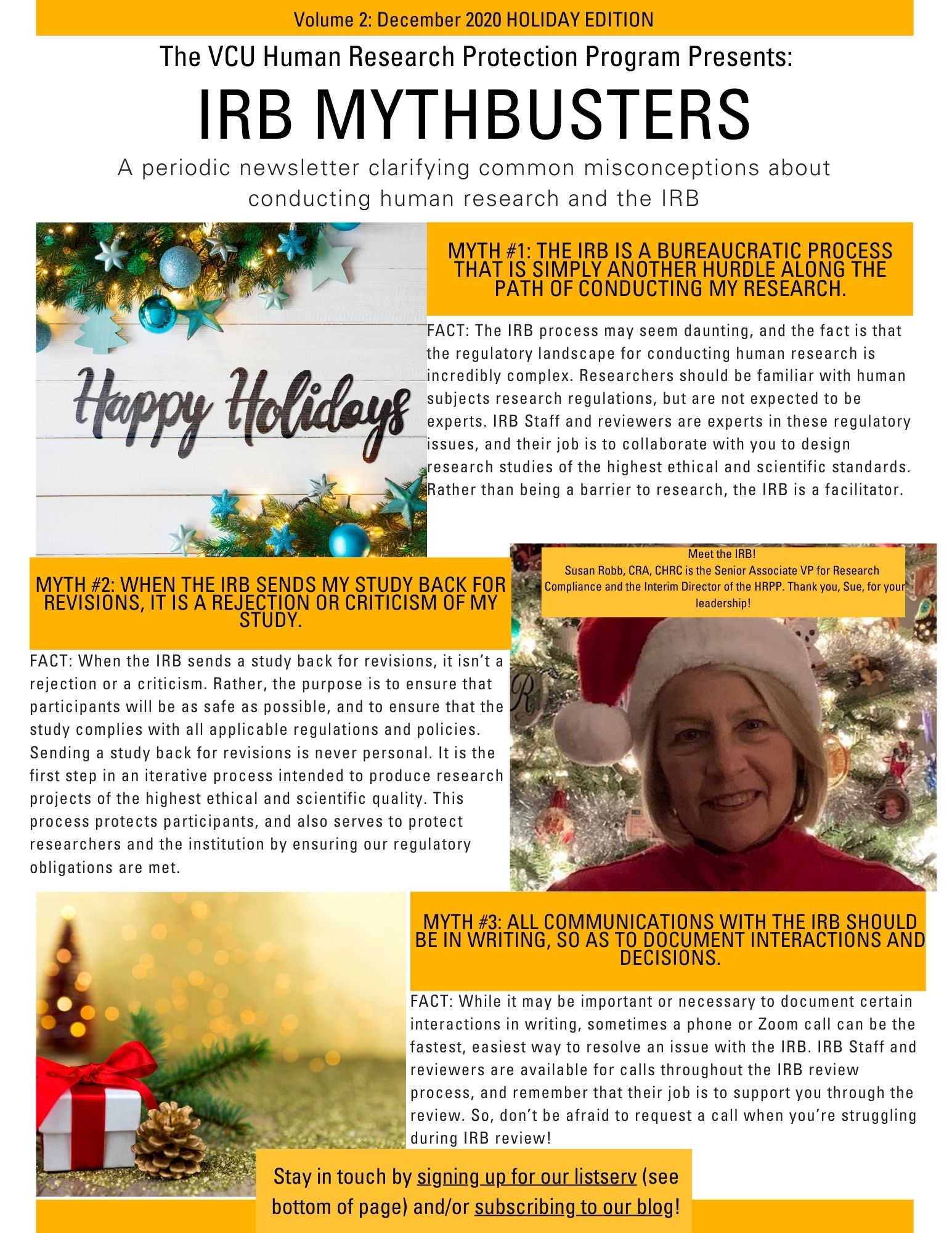IRB Mythbusters – Interacting With the IRB
The VCU Human Research Protection Program presents IRB Mythbusters — a periodic newsletter clarifying common misconceptions about conducting human research and the IRB!
In this issue, “myths” surrounding interacting with the IRB are addressed. Access previous editions of IRB Mythbusters by visiting the “mythbusters” tag on our blog.
MYTH #1:
The IRB is a bureaucratic process that is simply another hurdle along the path of conducting my research.
FACT: The IRB process may seem daunting, and the fact is that the regulatory landscape for conducting human research is incredibly complex. Researchers should be familiar with human subjects research regulations, but are not expected to be experts. IRB Staff and reviewers are experts in these regulatory issues, and their job is to collaborate with you to design research studies of the highest ethical and scientific standards. Rather than being a barrier to research, the IRB is a facilitator.
TIP: Remember that researchers and the IRB have shared goals: to protect participants, and to advance science. The IRB seeks to collaborate with researchers and is designed to give an outside perspective both in terms of ethical issues and also in terms of ensuring that the project is well designed, operationalized, and understandable to others, both to participants and to fellow researchers. Well-designed, operationalized research plans protect participants, and produce good science.
MYTH #2:
When the IRB sends my study back for revisions, it is a rejection or criticism of my study.
FACT: When the IRB sends a study back for revisions, it isn’t a rejection or a criticism — rather, the purpose is, as always, to ensure that participants will be as safe as possible, and to ensure that the study complies with all applicable regulations and policies. Sending a study back for revisions is never personal. It is the first step in an iterative process intended to produce research projects of the highest ethical and scientific quality. This process protects participants, first and foremost, but also serves to protect researchers and the institution by ensuring our regulatory obligations are met.
TIP: There’s no such thing as a perfect first-time submission! When you’re immersed in a study, it’s easy to lose sight of the big picture. Research involves many moving parts, and it’s unreasonable to expect one person to get everything right on the first try. Remember that the IRB is here to support you in your research, and remember that feedback on your study is not a criticism or a rejection, and is instead a genuine effort to ensure the protection of participants and the quality of your study.
MYTH #3:
All communications with the IRB should be in writing, so as to document interactions and decisions.
FACT: While it may be important or necessary to document certain interactions in writing, sometimes a phone or Zoom call can be the fastest, easiest way to resolve an issue with the IRB. IRB Staff and reviewers are available for phone and Zoom calls throughout the IRB review process, and remember that their job is to support you through the review. So, don’t be afraid to request a call when you’re struggling during IRB review!
TIP: During the IRB review process, the person designated as your “IRB Coordinator” will be the best person to contact with questions about the review. Reach out to this person as much as you need, and don’t be afraid to request a phone or Zoom call! Remember that verbal communication can always be followed up with written documentation when appropriate.
You can find your assigned IRB Coordinator in RAMS IRB:
Once you know who your IRB Coordinator is, you can find their contact information on our website. If you contact the office or any member of the office by telephone and are unable to reach someone directly, please leave a message. All calls will be returned in a timely manner.
Stay in touch and continue to receive the IRB Mythbusters Newsletter by signing up for our listserv (see bottom of page) and/or subscribing to our blog!
